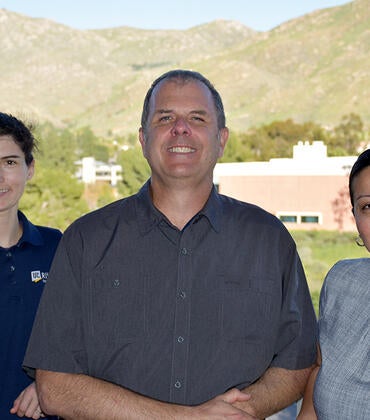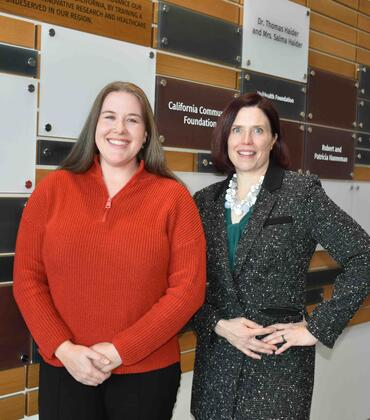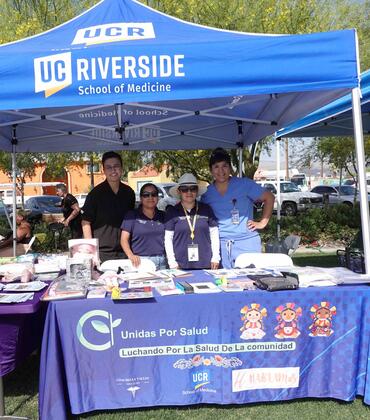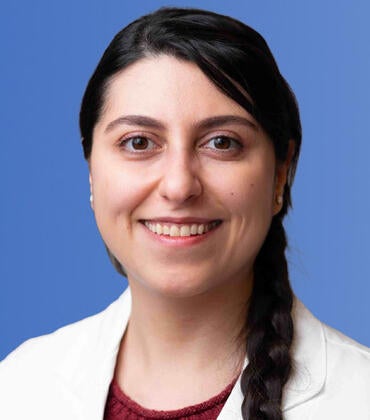
Beginning medical school during the pandemic, UCR SOM class of 2025 graduate Jennifer Pinal studied in a cramped back house with no air conditioning, repurposing second-hand furniture to create a makeshift study space. As a single mother, she balanced medical school with her kids’ Zoom classes, grocery runs, and keeping her car running to get to class. "It’s a constant balancing act when resources are stretched thin," Pinal said, reflecting on how her daily struggles diverted her focus from simply being a student.
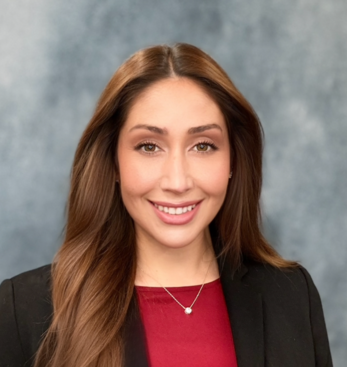
Despite the challenges, Pinal remained committed to serving her Southern California community and to her dream of becoming a doctor, both before and during medical school.
“My process of getting into medical school was essentially doing volunteer work as the person who needed the help,” Pinal said. In 2014, after returning home to Pomona with an undergraduate degree from UC Berkeley and two young sons, Pinal had no transportation or financial stability. She worked as a restaurant hostess and in a Federally Qualified Health Center as well as volunteered in free clinics while working toward her dream.
Pinal’s experience motivated her to become the kind of doctor who would understand patients like her. “I wouldn’t recommend organic food options or expect someone to drive to appointments without first understanding their circumstances,” said Pinal, recalling that she took buses to attend her prenatal appointments in the Bay Area and rented a breast pump. “It's about meeting patients where they are, asking questions, and not making assumptions.”
“These are my lived experiences that allow me to see patients who I would be able to empathize with, to be able to understand because of the barriers that I faced in healthcare,” Pinal added. “That's why I'm just so passionate about giving to my community, because these may be things that patients struggle with… and I think it benefits doctors to understand what that life is like.”
Pinal applied to the UCR SOM to remain near her support network for raising her kids while continuing to serve her home community and improve health in the area. “If this was in the stars for me, UCR would be the school that I went to,” she said.
Serving patients through surgery and research
Pinal, who saw her first surgery during a sponsored trip to Tanzania in 2018, immediately felt drawn to the specialty. “Even just watching someone regain the function of a whole limb because of an intervention, because of the skill and knowledge involved, was incredibly inspiring,” said Pinal, who will enroll in the General Surgery Residency Program at Southwest Healthcare Medical Education Consortium in Temecula Valley after graduating from the SOM in June.
The initial spark stayed with her, then grew during her surgery clerkships. “When you're closing a patient and making sure the scar looks beautiful, it becomes a symbol of the care we’ve provided; something they’ll carry with them for the rest of their lives,” she said.
Besides directly helping her patients with surgical procedures, Pinal hopes to serve them through research. She learned to design research protocols and gather data while working on clinical trials at Kaiser Permanente before medical school, which later framed her way of thinking when she noticed specific shortcomings in medical care, such as access to surgery.
“I don't want to just focus on identifying the health disparities in our communities, because they're so vast…but I do want to talk about how to improve [surgical] outcomes overall, and to change care,” Pinal said. “My lived experiences have shaped the questions that I ask, and that's the special part of doing research, because my questions will be different from other people's and we need more voices in research to explore things that impact our community from people who are from the community,” she added. “I'll have the privilege of exploring them, using my voice as a doctor.”
Support for success
Pinal emphasized that she didn’t get through medical school alone. Mentorship played a role in her success, particularly given her position as a first-generation medical student with limited knowledge of the medical school system.
She attributed her success on her Step 1 and Step 2 exams to working with Christina M. Granillo, PhD, director of the Office of Academic Success and an assistant clinical professor of health sciences. “I would just talk about my plans to study and get support and get tutoring, and really just put myself out there and essentially be vulnerable to figure out how to improve,” Pinal said. “I think it was that growth that really made me stronger throughout medical school, and that I always tell underclassmen: Just do your best, don't try to be perfect.”
Granillo said that first-generation students like Pinal often benefit from learning new study strategies that they may not have needed before the challenges of medical school. “It got her to where she had the capability–that she always had–to reach [her] goals,” said Granillo, adding that she also saw Pinal advocate for her fellow students while balancing her own responsibilities. “It's these students like Jenn, that you're just so glad they're fulfilling the [SOM’s] mission from start to finish,” she said. “I’m just proud to be part of her journey, and I look forward to the way that she's going to continue to give back to our community.”
The Latino Medical Student Association (LMSA) at UCR also gave Pinal an opportunity to find mentors who could understand her experiences and help her navigate medical school. “Immersing myself into organizations who have the same goals or come from the same backgrounds really helped, and then it became a family to help give support through these challenges that arose in medical school,” she said.
Pinal contributed to the LMSA in turn, volunteering on their board and serving as co-vice president of conference for the 41st annual Latino Medical Student Association (LMSA)-West Regional Conference at the UCR SOM in February. The event, which Pinal said took about a year to plan, attracted around 700 attendees and offered workshops and panels covering immigration rights, mental health in Latinx communities, tools for navigating health policy, and more. “It was such a vast agenda that it was extremely educational for people,” Pinal said. LMSA brings together students from similar backgrounds, “and when we come together…we are able to plan and explore ways to give back to our community,” she added. “It empowers us to be leaders as medical students, and I think that's really special.”
In addition to her LMSA network, Pinal said that she received support from UCR. “Our financial aid team understood that first generation and lower income students have special financial burdens,” Pinal said, adding that they also had resources specifically for student parents. This included loans for emergencies like when Pinal’s car broke down, a program that provided tutoring for Pinal’s kids, and a program where donors gave Christmas presents to the children of families in need. “Every year, I always have a picture of the gifts that my kids got from the school, whether it was warm jackets or art supplies,” Pinal said. “I was truly grateful for them, because it's that sense of community that makes UCR so special.”
“Don’t call me a superwoman”
While Pinal said she believes her family is proud of her success, she knows for sure that her two twin sons Adrian and Julian, now 15 years old, are proud because they tell her. “They write me notes before every exam that I could take with me and use as cute little inspiration for myself when I'm not feeling too great,” Pinal said. “They've always been supporting me, even from my first year before my exam where they were like, ‘You're going to do great,’ in their cute little [voices] at the time.”
Despite her efforts balancing medical school, life as a single parent, and other challenges, Pinal emphasized that she isn’t a superwoman. “Especially for single parents, we're working [hard] because we're in survival mode, and it's not something to be celebrated; it means we just need support,” Pinal said. “When we're put into this image of a superhero, you think of somebody who can do it all and do it well and always look good doing it, and that's definitely not the case,” she added. “I don't feel like a superhero. I'm just trying my best.”
Pinal labeled her path a "sacrifice," but also said it was worthwhile. “You look back and realize how far you’ve come, and you’re proud, not just for yourself, but for what that means for others," she said. "I’m the first in my family to do this, pushing forward and navigating a system that was never built for us, and in doing so, I’m showing my kids that nothing is out of reach, and that they can rise above the structural barriers and limitations placed on our communities,” she added. “That kind of example, and the care I’ll give to my community because of it, makes every sacrifice worth it.”
